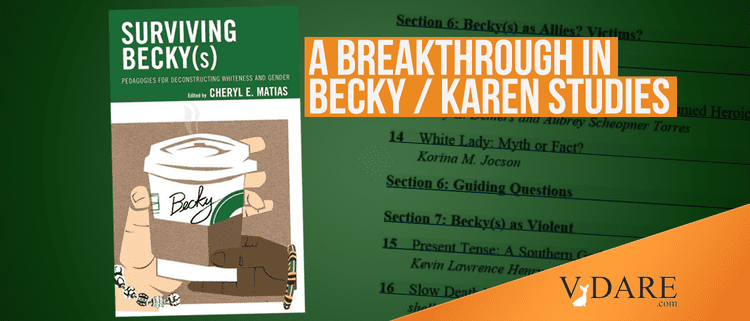Surviving Becky(s): Pedagogies of whiteness and Gender
Edited by Cheryl E. Matias, Ph.D., University of Colorado Denver
Abstracts due 7/1/18
BECKYISM & WHITENESS
The term “Becky” is gaining popular parlance both in the informal critiques of the academy, specifically in the field of education, which is replete with white females, (see Matias & Nishi, 2017) and in the general public (see “5 Types of Beckys” …
But who embodies the Becky? Are all white women Beckys? Although there have been social, literary, and historical ruminations of the characterization of white women as Miss Ann, the modern characterization of Becky is different and has no academic literature that explores 1) what is the characterization of Becky, 2) why such characterization is relevant to education, and 3) how that characterization impacts the hope for diversity, racial justice, and equity in the P-20 pipeline. Plainly, to date there exists no literature that formally explores the theoretical and practical implications of the Becky.
… Finally, Godfrey (2003) further interrogates the oft association of innocent and sweetness to white women in her critical historical analysis of the “sweet little white girls” who vehemently reacted to the Little Rock Nine in 1957 post Brown v. Board of Education. In her analysis she shows how the characterization of “sweet little white girls” left the vitriol, violence, and aggressive behaviors of white women during that time intact and uncovered. Clearly, the study of white women is nothing new yet the particularities of the modern conceptualization of Becky are in order.
THE PROPOSED BOOK
As such, the proposed edited book is the first to survey the increasing phenomenon of Beckyism. That is, since there is much confusion on who embodies the Becky this proposed book will identify the following: who embodies the Becky, why is such an embodiment a relevant phenomenon to explore, and how can utilizing this characterization help scholars, educators, students, and staff who are committed to diversity and inclusion understand how might racial and gender dynamics impact students, faculty, and staff of color working in predominantly white institutions (e.g., schools, universities, etc.). However, because revealing racial and gender microaggressions are, at times, retaliatory, the book encourages contributors to write their experiences with Beckys in fan fiction style. Fan fiction, as Preston (2013) suggests, are “those types of narrative writing that take existing fictional setting as the basis for further speculative fiction” (p. 9). Meaning, each chapter will have no citations and be written in a 3,000 to 4,000-word creative or literary short story form with a setting, character(s), possible dialogue, and plot. Per Critical Race Theory’s methodology of counterstorytelling as a way to counter majoritarian stories (Solorzano & Yosso, 2001) and parables to illustrate the dynamics of race in fictional ways (see Bell, 1992) these stories not only can be based upon actual lived experiences with Beckys or a composite of Beckys, but can be seen as nonthreatening ways to illuminate how the characterizations of Beckys impact folks of color or other racially just individuals. …
QUALIFICATIONS

Having explored and opened the field of the emotionality of whiteness in my first book, Feeling White, earning several distinct recognitions for my work in whiteness, and knowing the immediate negative reactions to whiteness studies particularly from whites, I opt to engage in a different format to further understandings of whiteness and its dynamics; particularly, Critical Race Theory’s storytelling and parables. The purpose here is not to vilify all white women. Instead, the goal is to highlight how behaviors, attitudes, emotions, rhetoric, and epistemological stances can, at times, mimic Beckys who, beyond their intention to do good and be liberal, engage in ways that ultimately exert whiteness. These exertions in turn are traumatic, passive aggressive, violent, or simply counterintuitive to the goals of racial justice, antiracism, or educational equity for folks of color.






